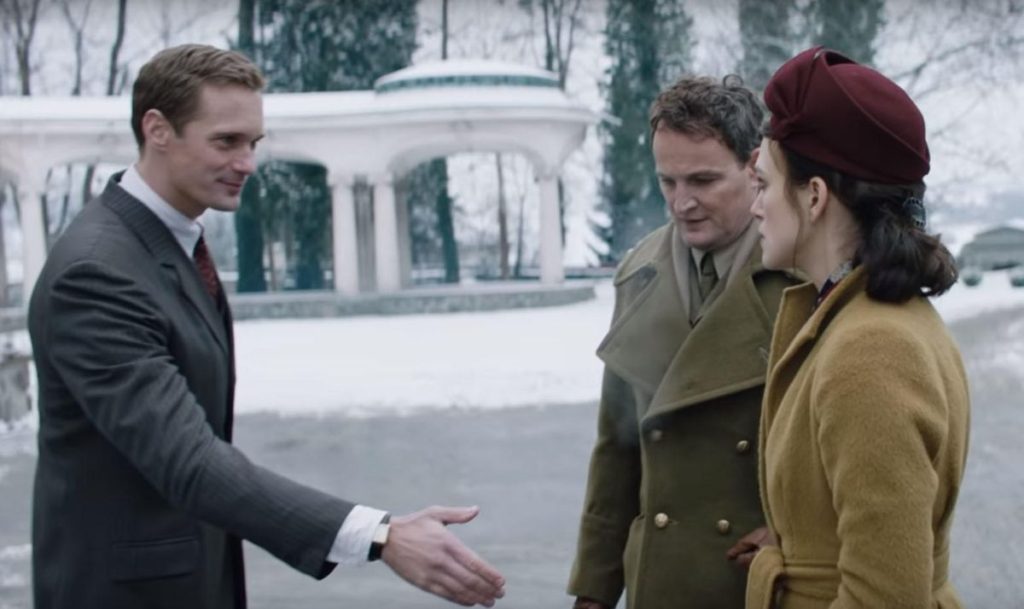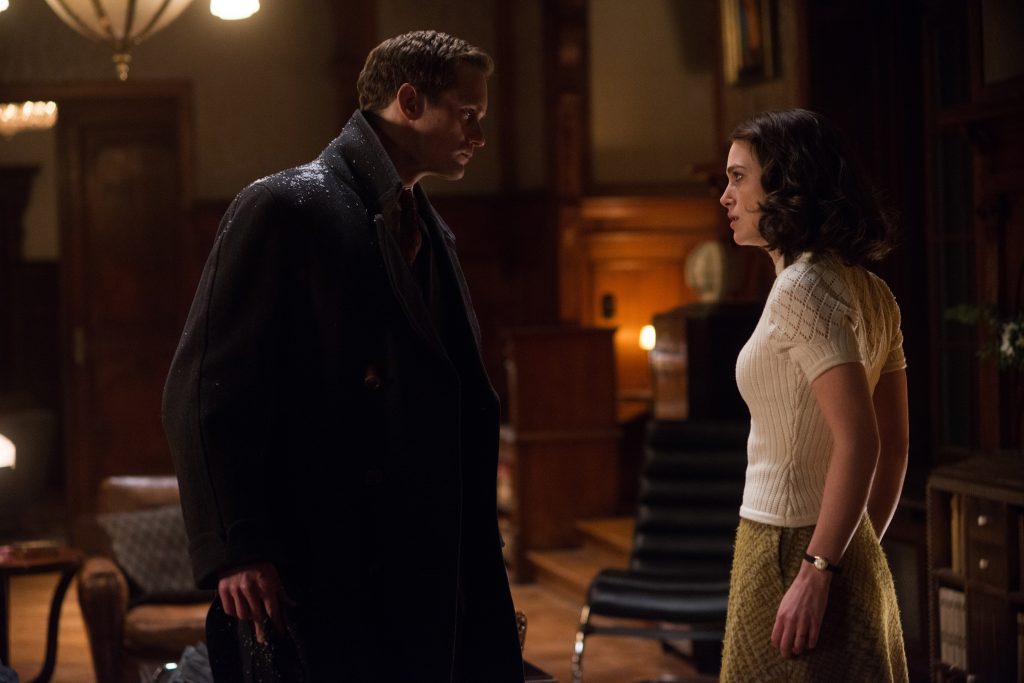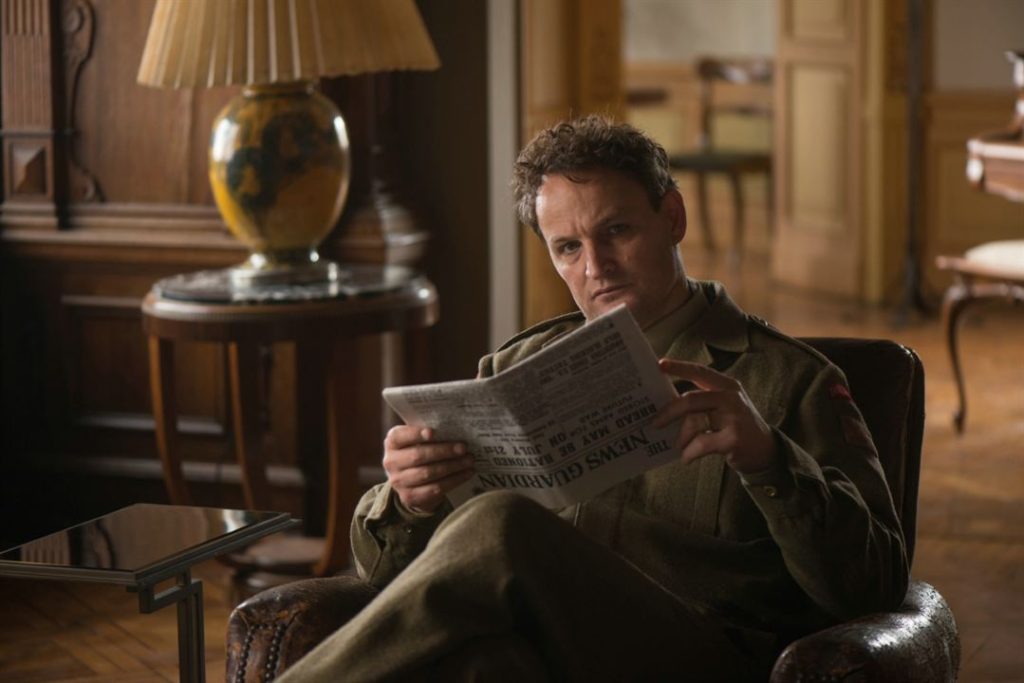
Quality acting may not be able to make a bad movie good, but it can certainly make a silly movie less silly, and more watchable. The Aftermath, James Kent’s sober and strenuous adaptation of Rhidian Brook’s novel, is in many ways unpersuasive, with clunkily conceived characters, overly decorous presentation, and dubious politics. But its performances, particularly those of Keira Knightley and Jason Clarke, are exemplars of craft and commitment. With elegance and poise, they take a soapy, soggy romance and lift it into the realm of juicy, entertaining melodrama.
This is nothing new for Knightley, who has made something of a career out of elevating prestige period pieces with her cut-glass precision and simmering feeling. Just last year, she applied her considerable talents to Colette, helping turn what appeared to be a stodgy biopic of feminine awakening into a bawdy, sexy romp. Unfortunately, The Aftermath lacks Colette’s sense of impish fun; nor does it move with the same directorial alacrity that Joe Wright brought to his excellent collaborations with Knightley (Pride & Prejudice, Atonement, Anna Karenina). It is instead decidedly tasteful, with a gentle score, a lacquered production design, and a profound fear of offending anyone.
Least of all ’ze Germans. Set in Hamburg in 1946, The Aftermath imagines a post-war Deutschland that is populated primarily by dutiful, apologetic citizens who are terribly ashamed of the Nazi regime. It’s a simplistic sketch that feels scrubbed of any real complexity or turmoil; there’s even a whiff of bothsidesism to the portrait, a facile suggestion that we all make mistakes and that we all must forgive and forget. To be sure, a handful of Hitler devotees still skulk in the streets, plotting revenge and branding themselves with “88” tattoos. (In case anyone in the audience fails to discern the numerological significance of these markings, the film explains it to them—twice.) But their presence is designed to serve as an outlier, a stark contrast against the fundamentally decent souls who suffered equally during the war, and who continue to suffer now that their government has been toppled and their homes invaded by foreigners.

One of those interlopers is Colonel Lewis Morgan (Clarke), a British officer charged with overseeing the renovation of a city that’s cluttered with wreckage, ashes, and corpses. A committed solider in it for the long haul, Lewis sends for his wife, Rachael (Knightley), whom he greets at the train station with a painfully chaste peck on the cheek. They’re both still mourning the death of their 11-year-old son, who was killed during the Blitz, but they resolve to make a new start in the lavish homestead where the Army has quartered Lewis. The catch: This modest mansion currently belongs to Stefan Lubert (Alexander Skarsgård) and his teenage daughter, Freda (Flora Thiemann), and while most similarly situated German nationals have been dispatched to camps, Lewis resolves to let the Luberts remain in the house, a noble gesture that nevertheless leads to conflict and disharmony.
The specific contours of this inevitable clash may surprise the characters, but they will hardly shock you, even if you haven’t already seen the overly informative trailer. Frankly, the biggest spoiler of The Aftermath is its casting, which is so perfect, it’s almost rude. Clarke, with his rumpled features and tousled hair, is precisely the sort of cinematic husband destined to be cuckolded. And Skarsgård, whose jaw slices through the winter skyline like a bayonet, is a born seducer, with a swaggering physique and searching, searing blue eyes. What’s a grieving housewife in a strange land whose husband is fixated on his challenging work to do?

Act, is what. Knightley is always attuned to her characters’ inner desires, and here she turns Rachael into a figure of quiet desperation, outwardly steely—early on, she pointedly refuses Stefan’s handshake, an image that Kent cleverly mirrors later on—but secretly crumbling from loneliness and loss. It’s yet another exquisite performance in a career full of them—roiling but restrained, plaintive but also guarded. Happily, she’s matched by Clarke, who manages to articulate Lewis’ emotional impotence as a sort of tragic flaw; he wants to be a good romantic partner but, like an untrained dancer, he just can’t figure out the steps.
Compared to them, Skarsgård’s portrayal is somewhat blank, though that may be attributable to Stefan’s thinness as a character. He is an uncommonly generous and sensitive fellow; as a father, he parents Freda with the ideal combination of sternness and tenderness—his wife died during the Allied bombing years earlier, a convenient symmetry to Rachael’s own bereavement—while as a native German, he makes clear that he loathed the Fuhrer. He is, in other words, a beautiful construct (he even chops his own wood!), a gorgeous lifeboat for Rachael to fling herself onto.

Which she does, and with some enthusiasm. The handful of sex scenes in The Aftermath carry a bit more heat than in your typical prestige production, and their energy helps give the film’s manufactured love triangle a bit of kick. And even though the movie’s overall trajectory is predictable and somewhat laughable, it is not unpleasurable. The actors pantomime their emotions with such passion—in addition to Knightley and Clarke, Kate Phillips is very good in a handful of scenes as Rachael’s knowing confidant—they help prevent Kent from getting bogged down in costume-drama trappings (some of which, such as one of Rachael’s billowing yellow dresses, are appealing in their own right). The apex is a nighttime scene on a piano bench, the characters letting the Steinway speak for them as they silently communicate currents of feeling.
Ironically, for a film about rebuilding and rebirth, The Aftermath collapses completely in its final act, with some ludicrous pistol-waving, a badly undercooked subplot involving a teenage hooligan, and several hilariously sudden shifts in behavior and motivation. Perhaps it’s a meta commentary; movies, much like totalitarian regimes, can be unstable. Then again, that’s too provocative an idea for The Aftermath, which is inoffensive, unmemorable, and damnably enjoyable. The movie may be preoccupied with digging out from rubble, but it’s the actors who are the real rocks.
Grade: B-
Jeremy Beck is the editor-in-chief of MovieManifesto. He watches more movies and television than he probably should.
